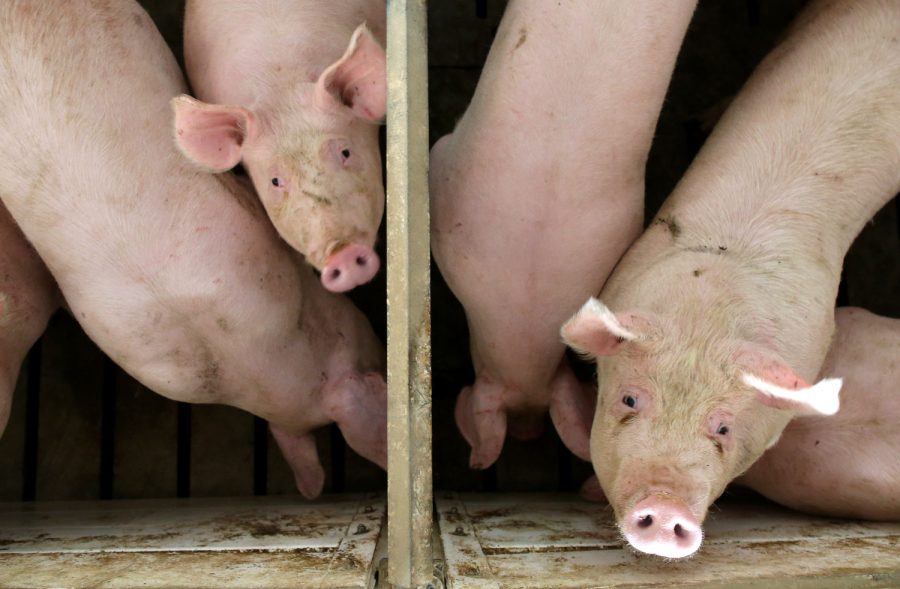Opinion | Hog monopolies hurt farmers and consumers
The pork industry has become increasingly consolidated, and it’s time to break up big ag.
Hogs occupy pens at a confinement facility in Ayrshire, Iowa, in this file photo.
September 27, 2021
For Iowans, hog farming previously conjured up images of pigs playfully rolling around in the mud while farmers and their families work from sunrise to sunset to tend to them.
This image could not be further from the truth. Hog farming, one of the largest industries in Iowa, has become consolidated and industrialized. Pork monopolies are destroying the livelihoods of family farms, the environment, and the wallets of consumers. It is time for regulators to break up these conglomerates.
The business model for the pork industry has killed family hog farms in Iowa. Over the past 30 years, the number of hog farms have decreased by 26,000. Those hog farmers who remain independent struggle to get by, as they are priced out by companies such as Iowa Select Farms, the largest pork producer in the state.
The pork companies were able to gain a stranglehold on the pork market by engaging in contracting and integration. Contracting is the process in which large pork producers co-opt local farmers into helping raise hogs, which they then sell back to the producers.
Integration, on the other hand, is when a company has control of all the factors of production, from raising and slaughtering to packing and transporting the meat. Through integration in particular, companies such as Iowa Select Farms have been able to increase the state’s pig population by 50 percent.
However, with this increase in the pig population comes economic inefficiency and environmental degradation. The millions of Iowa pigs produce the same amount of waste as 84 million people, leading to a decrease in Iowa’s water and air quality.
The hog industry’s conglomeration also has bad outcomes for pork consumers. If the hog market were a truly competitive market, where thousands of family farms would be directly selling to consumers, market forces — such as the supply of pork and consumer demand for pork — would be deciding the goods’ price.
Instead, the firms in the pork industry have monopoly power over the market.
When a firm has monopoly power, it can set the price of a good at any point of production it wants. Since firms want to maximize their profits, the monopolist will set its price where this is achieved.
During the COVID-19 pandemic, the companies that control the hog industry exercised their monopoly power and artificially raised the price of pork by 12 percent to make more money.
Federal lawmakers need to take steps to break up the pork monopoly. In their push to combat monopoly power in a variety of industries, the Biden Administration has assembled an antitrust team made up of legal experts and economists critical of consolidation.
Meanwhile, in the halls of the U.S. Senate, Sen. Chuck Grassley, R-Iowa, has been a champion for family farmers for years. He has tried to push Congress to pass a law in which meat packers — including the hog industry — cannot own livestock, which in theory would end integration.
However, his bills have repeatedly failed to pass as the hog industry’s lobbying arm has convinced members of Congress to protect their business practices.
Iowa farmers, citizens, and national consumers have all been hurt by the hog market’s transformation into a monopoly. Lawmakers at the federal level must see that faceless corporations — not the local farmers and consumers — have control of pork production in the state.
Breaking this monopoly up would allow family farmers the opportunity to get back into the business and for consumers to buy pork at a stable price.
Columns reflect the opinions of the authors and are not necessarily those of the Editorial Board, The Daily Iowan, or other organizations in which the author may be involved.



